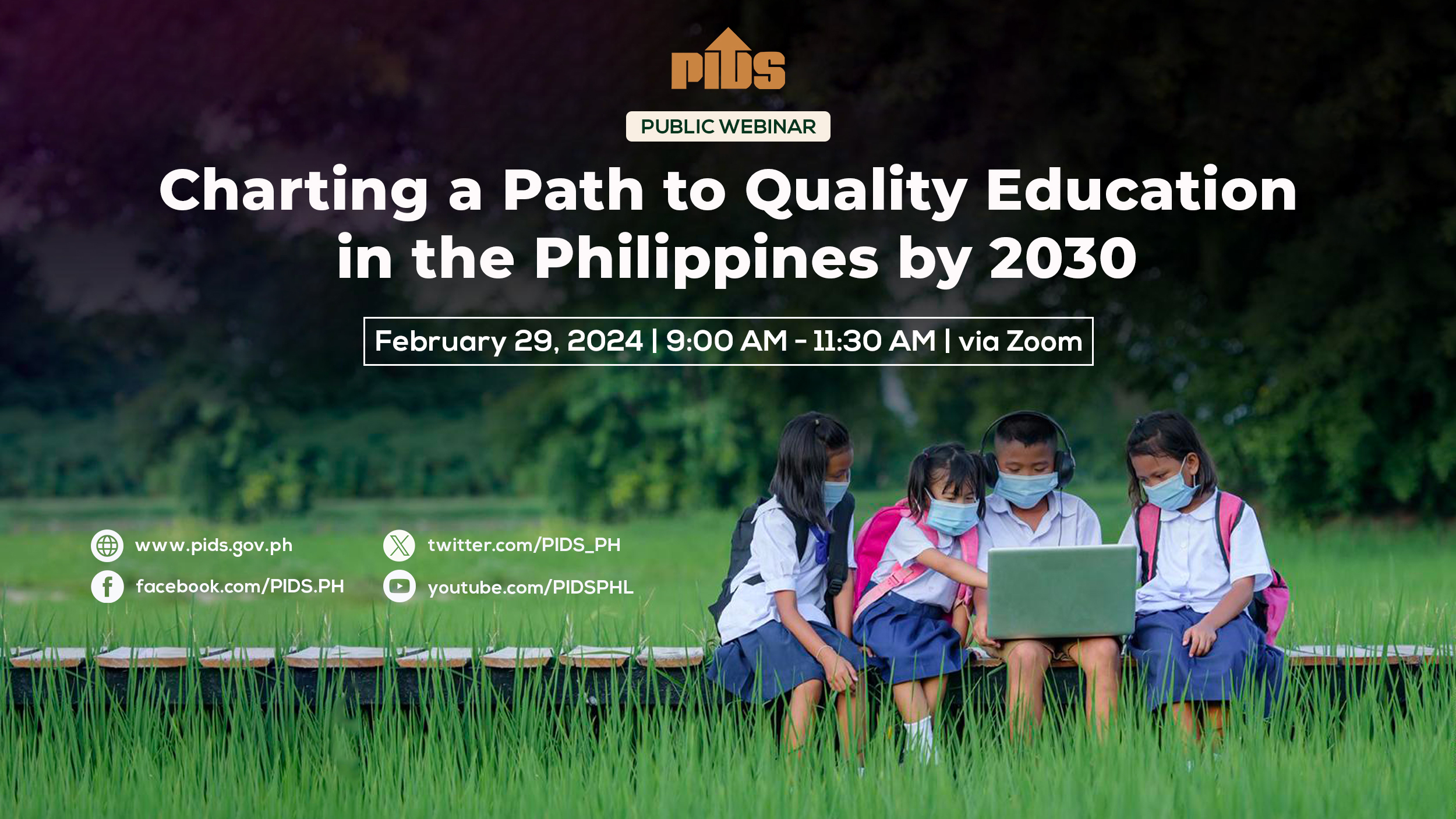The Philippine Institute for Development Studies (PIDS) will conducted a Pulong Saliksikan on “Distance Education through the Massive Open Online Courses (MOOCs)” on 27 January 2015 from 2:00 p.m. to 4:00 p.m. at Romulo Hall of the NEDA sa Makati Bldg., 106 Amorsolo St., Legaspi Village, Makati City.
The world ranking of the Philippine education system is not looking good. The 2003 Trends in International Mathematics and Science Study (TIMSS) shows the country 41st in science and 42nd in math among 45 countries. The TIMSS is an international assessment of math and science skills among primary and secondary school students conducted every 4 years. The country’s ranking has not improved since 1999 and did not participate in the 2007 and 2011 survey. This shows that the Philippine education system is in dire need of improvement.
Marito Garcia, PhD, discussed new ideas on how MOOCs can be tapped to support service delivery in the education sector. He is an adviser to the World Bank and currently an adjunct faculty at the Darden Business School, University of Virginia. He was Lead Economist and also Sector Manager for Education in Latin America and the Caribbean at the World Bank.
Dr. Garcia presented a "Big Results Now" approach to enhance student outcomes, supported by information technology (IT) and MOOCs. Learning at scale is now made possible with the emerging use of IT and the "cloud technology" and by "big data analytics". The talk addressed the challenges in broadband, device, and content, which are key to access, equity, and quality of education. Impact evaluations in Chile, Nigeria, and the United States prove that there is promise. MOOCs could deliver results, but design challenges should be overcome. MOOCs would need to be hyper-localized to succeed, and need to be blended as an approach to achieve learning outcomes.
This seminar also highlighted emerging world trends in the use of MOOCs and technology to improve education as well as the skills of the workforce. MOOCs are increasingly being used in improving access and quality of education and skills development in many countries. Since the start of the MOOCs revolution in 2012, about 89 different platforms have emerged, with increasing numbers of enrollment. Coursera, the pioneer platform founded by Daphne Koller and Andrew Ng, both professors at Stanford University, increased enrollment from 1.2 million in mid-2012 to 10 million today, and is growing at 400,000 enrollment per month. Outside the United States, MOOCs have grown by leaps and bounds, with new blended models using flipped classrooms especially in China, South Korea, Japan, and even in the Philippines. What is the impact of these, and how should public policy support the development of MOOCs to support education?
DOWNLOAD PRESENTATION
VIEW PHOTOS

Visit Events Photo Gallery Page to view photos of this event.
For more information, please contact:
Ms. Necy Aquino
Email: naquino@mail.pids.gov.ph
Tel. No: (632) 893-5705
Fax Nos: (632) 893-9589 or 810-6261
Ms. Gizelle Manuel / Ms. Misha Borbon
Tel. No: (632) 892-4059
Date: December 10,2014
Time: 9:30
Venue: Room 208, NEDA sa Makati Bldg., Amorsolo Street, Makati City
The world ranking of the Philippine education system is not looking good. The 2003 Trends in International Mathematics and Science Study (TIMSS) shows the country 41st in science and 42nd in math among 45 countries. The TIMSS is an international assessment of math and science skills among primary and secondary school students conducted every 4 years. The country’s ranking has not improved since 1999 and did not participate in the 2007 and 2011 survey. This shows that the Philippine education system is in dire need of improvement.
Marito Garcia, PhD, discussed new ideas on how MOOCs can be tapped to support service delivery in the education sector. He is an adviser to the World Bank and currently an adjunct faculty at the Darden Business School, University of Virginia. He was Lead Economist and also Sector Manager for Education in Latin America and the Caribbean at the World Bank.
Dr. Garcia presented a "Big Results Now" approach to enhance student outcomes, supported by information technology (IT) and MOOCs. Learning at scale is now made possible with the emerging use of IT and the "cloud technology" and by "big data analytics". The talk addressed the challenges in broadband, device, and content, which are key to access, equity, and quality of education. Impact evaluations in Chile, Nigeria, and the United States prove that there is promise. MOOCs could deliver results, but design challenges should be overcome. MOOCs would need to be hyper-localized to succeed, and need to be blended as an approach to achieve learning outcomes.
This seminar also highlighted emerging world trends in the use of MOOCs and technology to improve education as well as the skills of the workforce. MOOCs are increasingly being used in improving access and quality of education and skills development in many countries. Since the start of the MOOCs revolution in 2012, about 89 different platforms have emerged, with increasing numbers of enrollment. Coursera, the pioneer platform founded by Daphne Koller and Andrew Ng, both professors at Stanford University, increased enrollment from 1.2 million in mid-2012 to 10 million today, and is growing at 400,000 enrollment per month. Outside the United States, MOOCs have grown by leaps and bounds, with new blended models using flipped classrooms especially in China, South Korea, Japan, and even in the Philippines. What is the impact of these, and how should public policy support the development of MOOCs to support education?
DOWNLOAD PRESENTATION
VIEW PHOTOS

Visit Events Photo Gallery Page to view photos of this event.
For more information, please contact:
Ms. Necy Aquino
Email: naquino@mail.pids.gov.ph
Tel. No: (632) 893-5705
Fax Nos: (632) 893-9589 or 810-6261
Ms. Gizelle Manuel / Ms. Misha Borbon
Tel. No: (632) 892-4059
Date: December 10,2014
Time: 9:30
Venue: Room 208, NEDA sa Makati Bldg., Amorsolo Street, Makati City
Gallery Images:












